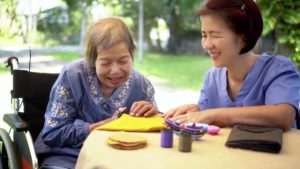Are you feeling overwhelmed, exhausted, and in need of caregiver support? Look no further. This article will provide you with essential resources that can help lighten your load and provide the assistance you deserve.

From support groups and online communities where you can connect with others who understand your challenges, to caregiver training programs that equip you with valuable skills, and respite care services that offer a much-needed break, we’ve got you covered.
Plus, we’ll explore financial assistance options available to ease the financial burden.
You’re not alone on this journey – let us be there for you.
Support Groups and Online Communities
Support groups and online communities can provide valuable resources for caregivers. As a caregiver, it’s important to know that you are not alone in your journey. These support networks offer a safe space where you can connect with others who understand the challenges you face on a daily basis.
In support groups, you can share your experiences, exchange advice, and receive emotional support from people who have been in similar situations. It’s a place where you can vent your frustrations, celebrate small victories, and find comfort in knowing that others truly understand what you’re going through.
Online communities provide convenience for caregivers who may not have the time or ability to attend in-person meetings. You can access these communities anytime, anywhere, making it easier to connect with others who are also caring for their loved ones.
Caregiver Training and Education
Training and education are crucial for caregivers to acquire the necessary skills. As a caregiver, you play a vital role in supporting your loved one’s health and well-being. By gaining knowledge and expertise through training programs, you can enhance your caregiving abilities and provide the best possible care.
Caregiver training equips you with practical skills, such as proper lifting techniques, medication management, and infection control. These skills not only ensure the safety of your loved one but also protect yourself from potential injuries or accidents.
Education is equally important for caregivers as it helps them understand their loved one’s condition better. By learning about specific illnesses or disabilities, you can anticipate challenges and provide appropriate support. Education also enhances your ability to communicate effectively with healthcare professionals and advocate for your loved one’s needs.
Remember that seeking training and education shows your dedication as a caregiver. It demonstrates your commitment to providing compassionate care while prioritizing both yours and your loved one’s well-being.
Respite Care Services
Respite care services provide you, the caregiver, with a much-needed break from your caregiving responsibilities. These services understand that taking care of a loved one can be physically and emotionally draining. They offer temporary relief, allowing you to recharge and take care of your own well-being.
Whether it’s for a few hours or several days, respite care provides a safe and supportive environment for your loved one while giving you some time off. During this break, you can attend to your personal needs, engage in self-care activities, or simply relax and rejuvenate. It’s important to remember that taking care of yourself is just as crucial as caring for your loved one.
Respite care services are here to support you on this challenging journey by providing the opportunity for rest and renewal.
Financial Assistance and Benefits
Financial assistance and benefits are available to caregivers to help alleviate some of the financial burden associated with caregiving. As a caregiver, it is important for you to know that there are resources out there that can provide much-needed support.
One such resource is the Family Caregiver Support Program, which offers financial aid for various expenses related to caregiving, including respite care services, transportation costs, and home modifications.
Additionally, you may be eligible for government programs like Medicaid or Medicare, which can provide coverage for medical expenses and long-term care services.
It’s crucial to explore all available options and seek guidance from organizations like the National Alliance for Caregiving or local caregiver support groups.
